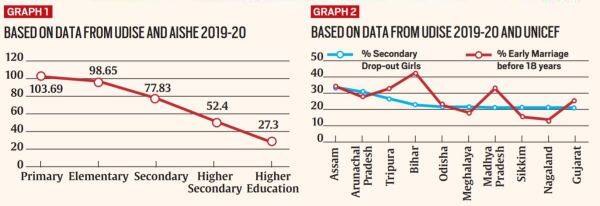ForumIAS announcing GS Foundation Program for UPSC CSE 2025-26 from 19 April. Click Here for more information.
ForumIAS Answer Writing Focus Group (AWFG) for Mains 2024 commencing from 24th June 2024. The Entrance Test for the program will be held on 28th April 2024 at 9 AM. To know more about the program visit: https://forumias.com/blog/awfg2024
Source: Indian Express
Synopsis: Addressing gender bias in education requires providing social, financial and emotional support to the girl child.
Introduction
In the recently held Olympics, Indian women showed their excellent performance. They can also excel in other fields like education. Women can contribute not just to the economy of the nation, but can also be the agents of social transformation.
This is evident from the World Bank review, which pointed that the global average for the private rate of return (the increase in an individual’s earnings) with just one extra year of schooling is about 9 percent. While the social returns of an extra year of school are even higher — above 10 percent at the secondary and higher education levels.
Impact of Corona on girls globally: It is estimated that over 2.4 crore girls globally are on the verge of dropping out of schools because of the corona pandemic. The main reasons behind that are pandemic-induced school closure & economic hardship.
In India
Before Pandemic:
- There was a gradual increase in the Gross Enrolment Ratio (GER) for women in higher education — from 19.8% in 2012-13 to 27.3 % in 2019-20. But the rate of dropouts is still high.
- This can be analysed from the graphs given below:

Graph1: It shows this gradual descent and the resulting paucity of women, who are even eligible to go to college.
Graph 2: Shows that states having the highest rate of secondary school drop-outs among girls are also the ones where a significant percentage of girls who get married before the age of 18 years.
What are the reasons to drop out?
- Girls engaged in domestic activities (31.9%)
- Financial Constraints (18.4%)
- Lack of developing interest in education (15.3%)
- Marriage (12.4%)
- Gender bias & patriarchy
Given the need for women empowerment, the government has taken numerous Initiatives:
- National Scheme of Incentives to Girls for Secondary Education (NSIGSE)
- Supernumerary seats in all IITs
- PRAGATI Scholarship scheme for girls in technical education
But government initiatives alone may not be enough. We need to take many more steps like:
- Mohalla school or a community learning programme: These should be started with appropriate Covid norms
NITI Aayog, with the help of civil society organisations, had started a community programme led by volunteers called “Saksham Bitiya”. It aims to train girls in socio-emotional and ethical learning. Such initiatives should be replicated to ensure more girls do not drop out of schools during the pandemic.
- To predict likely drop-outs, a gender atlas comprising relevant indicators should be developed.
- Teachers should also be trained in all the scholarships and schemes available which provide economic support to girls and their families for continuing their education.
- There is a need to revise the National Scheme of Incentive to Girls for Secondary Education in areas or states where there is a high prevalence of drop-outs and early child marriages
- Special education zones should be set up in areas that have been traditionally backward in education.
- The National Education Policy 2020 provides for a gender inclusion fund. This fund should be utilised to support STEM education in these schools as well as in all Kasturba Gandhi Balika Vidyalayas.
- State governments need to leverage existing schemes to design interventions to promote women in higher education.
- Behavioural nudges are the key to tackling social prejudices and orthodox cultural norms that prevent girls from achieving their innate potential.
- For this, Behavioural Insights Units (BIU) should be established across states to tackle social issues with the help of NGOs
Way Forward
The pandemic has brought unprecedented challenges for educators and students, especially for those on the margins, including girls. However, with informed targeting and an agile policy environment, this challenge could well prove to be an opportunity.
Terms to know




